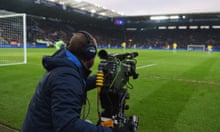If Simon Green is concerned about the prediction that Premier League TV rights are about to get billions of pounds more expensive then he is not showing it. The head of BT Sport is noticeably anxious but only because it is the broadcaster’s busiest live night in history.
At its cavernous studios on an industrial park in east London, runners and producers buzz around as Gary Lineker records the opening sequence, pausing briefly to pose for a photograph for his Instagram feed. It is the first round of the Champions League with Chelsea, Manchester United and Celtic all at home and a crack team of pundits assembled. Frank Lampard and Rio Ferdinand are already in makeup with Steven Gerrard hurrying down from Liverpool slightly later because he has been coaching the club’s under-18 team.
In the boardroom overlooking the main studio Green is already thinking ahead to the next Premier League broadcasting-rights battle. Ed Woodward, the executive vice-chairman of Manchester United, predicted last week that digital giants like Facebook, Amazon and Netflix could muscle in on the Sky and BT duopoly, forcing the price even further through the roof. The tender is expected before the end of the year and a heated auction will no doubt follow.
Some analysts have estimated that Sky might have to pay a premium of up to 45% on the near £4.2bn it paid last time by the time the deal is completed, probably in February. That means a further £1.8bn, or £600m per season. For BT, which paid £960m over three years for 42 matches per season, it would amount to an extra £432m to fend off the Silicon Valley threat. But Green does not see the tech firms changing the broadcasting landscape drastically for the next auction, which covers the 2019‑22 period.
“It’s hard to say how the sporting-rights market is going to play out with those brands,” he said. “The only one which has really dipped its toe into the water is Amazon, who bought the rights to the ATP tennis. What’s Amazon’s business model? Is it to sell tennis rackets on the back of showing it? Over a five- or 10-year span, I don’t see those brands competing in the sports-rights buying market in the way ourselves and other established broadcasters are.”
Green has been at BT Sport since its inception four years ago. He is better placed than most to judge the potential for growth in relation to Sky Sports having joined the then fledgling broadcaster in the early 1990s and also spent two years at Fox Sports in LA. He remains confident BT can retain the same number of exclusive Premier League TV matches and possibly more.
“It takes an awful long time to establish yourself as a sport broadcaster in this country,” he said. “We have a very-difficult-to-please public, more so than anywhere else in the world, when presented with change. With football the public genuinely believe deep down that it’s theirs. We’re picking up what they own on a Saturday evening and plonking it down in their sitting rooms. To do it exactly the way they want all the time is a very difficult ask.”
Green claims one of his biggest challenges is persuading rival sets of supporters that there is no favouritism in the way it schedule matches, only what makes most sense from a business point of view. This season has seen viewing figures improve in large part, Green thinks, because Manchester United are playing well.
“Manchester United are the biggest team in the UK with a UK audience,” he added. “Much as we enjoyed having Leicester in the Champions League last season, having Man U back does lift the competition as well as having Liverpool in it. We get accused on air sometimes of favouring United and get in trouble with City fans and Liverpool fans. Peoples’ rationality goes out of the window when we’re talking football.
“It’s difficult sometimes to have a rational conversation with a Manchester City fan and a Manchester United fan in the same room, whether it be about who should be on TV or who’s got the best left-back. That’s why it’s such a great soap opera and I never want it to end.”









Comments (…)
Sign in or create your Guardian account to join the discussion